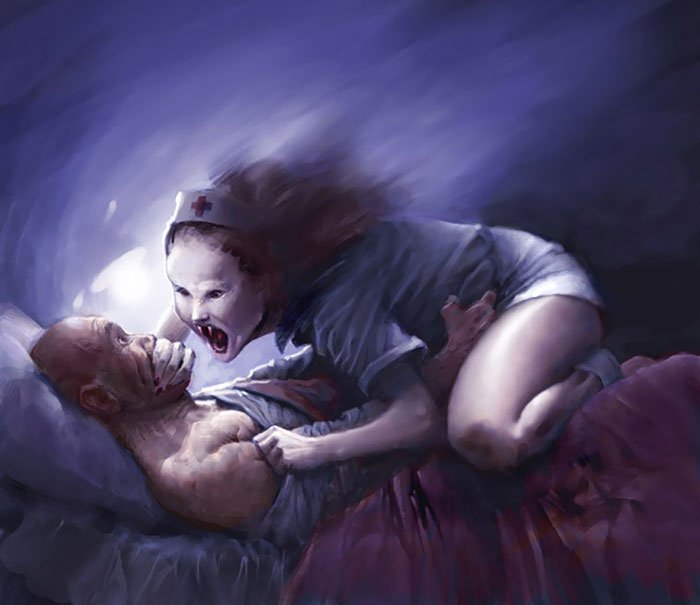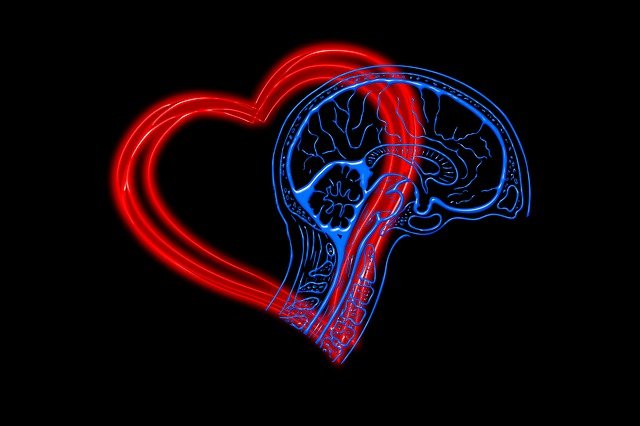What is sleep paralysis? This is a question that has troubled many and the experience is at times, beyond explanation. Let’s try and understand if sleep paralysis is common? If yes, what triggers sleep paralysis, what is its treatment, and even more about it.
Having experienced sleep paralysis since childhood, I know how it feels to have these scary stints occurring at night. The evil you feel around you or even on top of you is so real and bloodcurdling. I struggle to move but not even a muscle budges. I try to scream but of no use. The monster gets more powerful and scares me to hell with its growing demonic dominance.
Sounds like a scene from a horror movie? But unfortunately, this incident is from real life. As I have stayed all alone for long times, these terrifying tremors keep disturbing me, and I have always wanted to know why does sleep paralysis happen? Does this nightmare trouble you too?
Although there is still much to be known about sleep paralysis, let’s have a look at this waking nightmare get some understanding about how to be free from it.
Why is Sleep Paralysis so Scary?
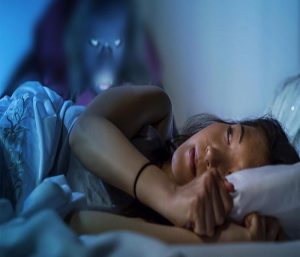
Sleep paralysis is a waking nightmare. We usually think that being awake or asleep is distinctive activity. But these boundaries are challenged by sleep paralysis. It occurs during the transition of sleep to wakefulness. Sleep paralysis lasts from a few seconds up to a few minutes.
Those who are curious to know is sleep paralysis dangerous? The answer is “yes”. It is so dangerous and scary because you can’t move or speak, despite being alert of some eerie presence with you. To make it worse, people hallucinate during this experience.
It is categorized as a type of parasomnia – abnormal sleep behavior. As it is associated with REM sleep, it is considered to be a REM parasomnia.
Causes of Sleep Paralysis
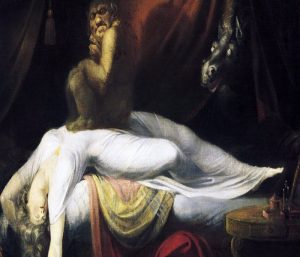
Sleep deprivation or a lack of sleep is among the major sleep paralysis causes. Other factors that contribute to why sleep paralysis happens include the use of certain medications, sleep-related problems like narcolepsy, sleeping on your back, and a varying sleep schedule.
As per Moss, “Sleep paralysis is not a sign of mental disorders. It is common – most people will experience it at least once in their lifetime. Sleep paralysis occurs at all ages, but is more common for people with irregular sleep schedules.”
Now the question arises, “What happens in the brain during sleep paralysis?” In short, during this phase, the brain tells the body that it is in the REM (Rapid Eye Movement) stage of the sleep cycle where atonia occurs (temporary paralysis of arms and legs) that avoids acting out dreams physically.
Normally atonia ends when the person wakes up and never knows of this inability to move. But in the case of sleep paralysis, atonia combines with REM. Heart rate increases, blood pressure rises, and breathing is shallow.
Types of Sleep Paralysis
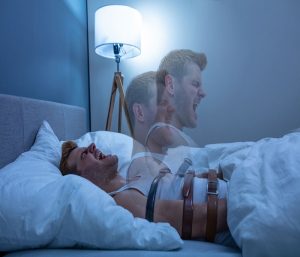
In the medical literature, sleep paralysis is categorized as –
- Isolated sleep paralysis: When a neurological disorder checks the brain from controlling wakefulness (not related to narcolepsy). It results in sleep paralysis.
- Recurrent sleep paralysis: As the name suggests, it involves multiple episodes over time.
There are cases when both the types combine and a condition called recurrent isolated sleep paralysis (RISP) occurs. Here, the person goes through ongoing instances of sleep paralysis without having narcolepsy.
What Does Sleep Paralysis Feel Like?
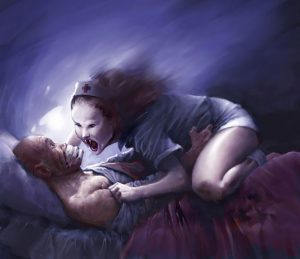
It is estimated that people hallucinate in 75% of sleep paralysis episodes. Atonia is the basic symptom of sleep paralysis, during which you feel awake and know that you have lost control over your muscles and movement. Troublesome hallucinations aggravate the disturbing episodes of sleep paralysis nightmare.
Hallucinations during sleep paralysis are categorized as –
- Intruder hallucinations: Such hallucinations give a feeling of having someone with malicious intentions or even a demon around.
- Chest pressure hallucinations: Also known as incubus hallucinations, these make a person feel like being suffocated or choked. And occur mostly with intruder hallucinations.
- Vestibular-motor (V-M) hallucinations: It involves out-of-body sensations such as flying.
Usually, these episodes end themselves. However, some are broken by an intense effort to move that ends atonia as well as someone’s voice or touch.
How Common Is Sleep Paralysis?
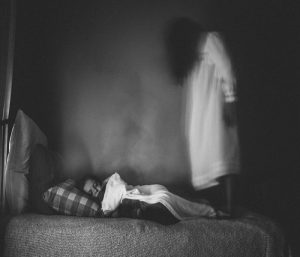
It is believed that almost 8% of people go through sleep paralysis in their life. However, the frequency of these episodes is not known clearly.
Many have the question, “Does everyone get sleep paralysis?” Concretely, nothing can be said about it as this phase of the sleep cycle is still being researched and studied. But it can be said that many do experience it.
Sleep paralysis is not restricted to any age but first sleep paralysis symptoms are estimated to be in childhood, adolescence, or young adulthood (ages 7 to 25). Episodes may occur more frequently in the 20s and 30s.
How to Avoid Sleep Paralysis?
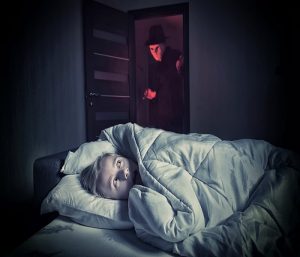
You can prevent sleep paralysis by –
- Sleeping 6 to 8 hours a day.
- Fixing your go to bed at night and wake up morning routine.
- Exercising regularly, but avoid within the 4 hours before sleeping.
- Improving sleep hygiene (bedroom setting, light, noise, and habits that impact sleep quality)
- Setting a pre-bed routine that relaxes you and makes comfortable
- Checking the comfort of your mattress and pillow
- Reducing alcohol and caffeine consumption, especially in the evening
- Refraining from using electronic devices for at least one hour before bed
Sleep Paralysis Treatment
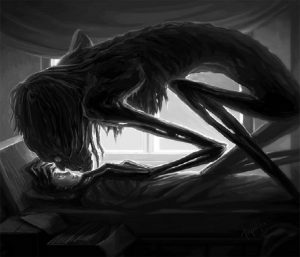
Everyone who has been through this bothersome experience wants to know how is sleep paralysis treated? The first step for sleep paralysis cure is consulting a doctor to diagnose the underlying issues that might be causing it. For instance, this might need managing sleep apnea or treating narcolepsy.
Other steps to fix sleep paralysis include –
- Treatment of any psychological/mental health problems that may contribute to sleep paralysis
- Use of antidepressants if prescribed to help regulate sleep cycles
- Go for cognitive behavioral therapy for insomnia (CBT-I) ( it reframes negative thoughts and emotions that detract from sleep)
Scientific evidence is quite limited when it comes to the treatment for sleep paralysis. Most people are oblivious to the fact that the condition is quite common. At times, people feel embarrassed about it. So, if the episodes continue in a fashion, don’t delay seeing a sleep disorder specialist. Also, never take any medication without a doctor’s consultation
Thus, it can’t be denied that sleep paralysis is an appalling experience. But you should not worry about it. It doesn’t harm your body and no sleep paralysis death is reported so far. Simply, tell yourself to stay calm and not be scared of the horrifying episode. Train your brain to count numbers or take it as a dream that will be over soon. It does feel like an eternity for the one who experiences but gets over within a few seconds.
If you would like to get more information on what is sleep paralysis? You can visit Wikipedia.

